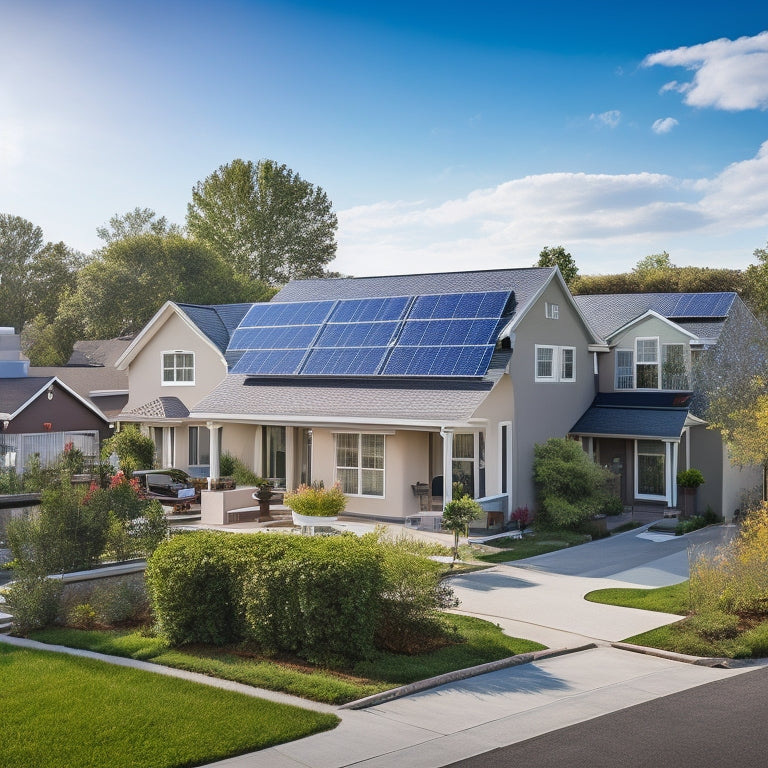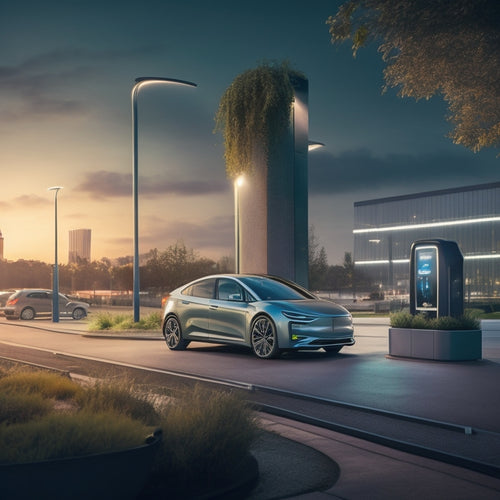
Solar Power for Your House
Share
You can utilize the power of the sun to change your home into a sustainable, energy-efficient abode, revealing significant financial savings and enhancing your property's value. With solar power, you can reduce or even eliminate energy bills, saving up to 50% on energy costs and becoming energy-independent from utility providers. Additionally, solar installations can increase your property's resale value by up to 15% due to long-term energy savings and reduced carbon footprint. To maximize energy output, it's essential to assess your roof's shading, configure your system correctly, and take advantage of government incentives like the 26% tax credit. Now, investigate the possibilities of solar power for your house and realize how you can reap its many benefits.
The Essentials
- Solar power systems can significantly reduce or eliminate energy bills, saving homeowners up to 50% or more on energy costs.
- Installing solar panels can increase property value by up to 15%, making homes more attractive to potential buyers.
- High-efficiency solar panels maximize energy output, achieving conversion rates of up to 23%, and proper system configuration is crucial for optimal energy generation.
- Assessing roof shading and obstructions is essential for optimal solar panel placement, as they can significantly reduce energy output.
- The federal government offers a 26% tax credit on solar installations, reducing upfront costs for homeowners who own and use their solar panel system.
Zero Energy Bills
By installing a solar power system, you'll considerably cut your energy expenses and potentially eliminate them altogether.
With a well-designed system, you'll generate enough electricity to power your home, freeing you from relying on utility bills.
Additionally, you'll increase your home's value and appeal, making it a more attractive selling point should you decide to move rooftop solar energy.
As a result, you'll enjoy a dramatic reduction in your energy costs, or even zero out your energy bills altogether.
Cut Energy Expenses
Since you're considering solar power for your house, cutting energy expenses is likely at the top of your priority list.
With traditional energy sources, you're at the mercy of fluctuating prices and unpredictable bills. Solar power, on the other hand, offers a reliable and consistent way to reduce your energy expenses.
By investing in innovative technologies like Renewable Energy Solutions, you can tackle multiple concerns at once, including reducing your electricity bills and carbon footprint.
By utilizing the sun's energy, you can considerably lower your energy consumption from the grid. This translates to substantial cost savings over time.
In fact, solar power can save you up to 50% or more on your energy bills. Additionally, with energy conservation measures in place, you can optimize your energy usage and maximize your savings.
Free From Utility Bills
Your energy independence awaits: imagine a life free from the burden of utility bills, where your solar-powered house generates all the electricity it needs. With a solar panel system, you'll be producing clean energy and reducing your reliance on the grid. This means you'll no longer be subject to rising energy costs or unpredictable rate hikes.
| Benefits | Description |
|---|---|
| Net Metering Benefits | Sell excess energy back to the grid and offset your energy costs |
| Zero Energy Bills | Produce all the energy your home needs and eliminate utility bills |
| Increased Property Value | Enhance your property value with a solar-powered home |
| Low Maintenance | Solar panels require minimal upkeep and last for decades |
| Flexible Solar Financing Options | Choose from various financing options to fit your budget |
Increases Property Value
When you install solar power in your house, you're not only reducing your energy bills but also increasing its value.
With top residential solar roofing solutions from companies like Tesla, you can expect a significant enhancement in your property's value.
By going solar, you'll elevate your property's resale value, making it more attractive to potential buyers if you decide to sell in the future.
Additionally, solar power adds a unique appeal to your property, setting it apart from others in the neighborhood.
Boosts Resale Value
Installing solar panels on your house can greatly enhance its resale value, making it a lucrative investment for homeowners. This increase in resale value is driven by current solar market trends, which indicate a growing demand for sustainable and eco-friendly homes.
As a homeowner, you can capitalize on this trend by installing solar panels, increasing your property's appeal to environmentally conscious homebuyers.
Research has shown that homebuyers are willing to pay a premium for homes with solar panels, resulting in a higher resale value. In fact, a study found that homes with solar panels sell for up to 15% more than similar homes without them.
This elevated value can be attributed to the long-term savings on energy bills, reduced carbon footprint, and the appeal of a modern, eco-friendly lifestyle.
Adds Unique Appeal
Solar panels convert a house into a modern, eco-friendly oasis, setting it apart from neighboring properties.
You'll stand out from the crowd with a unique blend of sustainability and style. By incorporating solar power into your home's design, you'll create an eye-catching aesthetic that showcases your commitment to environmental responsibility.
Aesthetic designs play a significant role in enhancing your property's appeal. You can choose from a variety of sleek, modern panel designs that complement your home's design structure.
Solar landscaping, which involves integrating solar panels into your outdoor space, can also add a touch of sophistication to your property. By incorporating solar power into your landscaping, you'll create a seamless blend of form and function.
As you customize your solar setup, you'll not only elevate your property value but also create a unique selling point.
Potential buyers will appreciate the eco-friendly features and modern design, setting your property apart from others on the market. With solar power, you'll experience the freedom to live sustainably while also enhancing your property's appeal.
Maximum Energy Output Guaranteed
You'll want to maximize your solar power system's energy output, and that's where high-efficiency solar panels come in.
By selecting panels with high conversion rates, you'll generate more power per hour of sunlight. Top brands like Tesla and SunPower offer high-efficiency solar panels that can greatly enhance your energy output.
Additionally, ideal system configuration plays a vital role in ensuring maximum energy output, which is why it's important to carefully plan and design your system.
High-Efficiency Solar Panels
High-efficiency solar panels, boasting maximum energy output assured, are engineered to enhance your house's energy harvesting potential.
These advanced solar panel technologies are designed to convert sunlight into electricity with unparalleled efficiency, guaranteeing you get the most out of your solar investment. By incorporating state-of-the-art features, such as high-efficiency photovoltaic cells and optimized thermal management, these panels can achieve energy conversion rates of up to 23%.
This means you'll generate more power per hour of sunlight, reducing your reliance on the grid and your energy bills.
When it comes to installation, expert technicians employ advanced installation techniques to verify your high-efficiency solar panels are mounted at the ideal angle and orientation to capture maximum sunlight.
This precise installation process, combined with the panels' exceptional energy output, assures you'll reap the benefits of clean, renewable energy.
With high-efficiency solar panels, you'll enjoy maximum energy independence and a significant reduction in your carbon footprint.
Optimal System Configuration
To maximize your energy independence, your solar panel system requires a customized configuration that optimizes energy output. This means selecting the right system size and inverter type to guarantee you generate the most power possible.
When determining your system size, consider factors like your energy usage, roof size, and local building codes. A system that's too small won't meet your energy needs, while one that's too large will be a waste of resources. Your system size will also impact the number of panels you need, so it's vital to get it right.
Choosing the correct inverter type is also significant. String inverters are the most common, but microinverters or power optimizers might be more suitable for your system, depending on your panel layout and shading conditions.
Microinverters, for instance, can optimize energy output at the individual panel level, guaranteeing you get the most power possible even in partially shaded conditions.
Assess Your Roof's Shading
You'll need to evaluate your roof's shading to determine how much energy your solar panels can produce.
Roof obstructions like skylights, vents, and chimneys can block sunlight, reducing energy output, so it's important to identify these features.
When considering off-grid power systems, it's vital to assess the impact of shading on your energy output, especially when relying on portable solar power kits.
Additionally, you'll want to analyze shading patterns over time, considering how trees, neighboring buildings, and other structures cast shadows on your roof throughout the day.
Roof Obstructions to Consider
Most roofs have some obstructions that can cast shade on potential solar panel installations, reducing their energy output. When evaluating your roof's shading, you'll need to identify these obstructions and determine how they'll impact your solar panel installation.
Roof orientation plays a significant role in determining the amount of shade your solar panels will receive. If your roof has multiple sections with different orientations, you'll need to take into account each section separately.
Additionally, installation challenges arise when obstructions like skylights, vents, or chimneys are present. These obstructions can cast shade on your solar panels, reducing their energy output. You'll need to decide whether to work around these obstructions or relocate them to guarantee ideal solar panel performance.
To accurately evaluate your roof's shading, take note of the obstructions' location, size, and shape. This information will help you determine the best solar panel installation strategy for your roof.
Shading Patterns Over Time
Shading patterns on your roof change throughout the day and year, affecting your solar panel installation's energy output. As the sun moves across the sky, trees, buildings, and other obstructions cast shadows on your roof, reducing the amount of sunlight that reaches your solar panels.
To optimize your energy output, you need to understand these shading patterns. Conducting a shading analysis is vital to identify areas of your roof that receive partial or full shade. This analysis takes into account seasonal variations, such as the changing angle of the sun throughout the year. By doing so, you can determine the best locations for your solar panels and the potential energy output of your system.
Seasonal variations greatly impact your roof's shading patterns. During winter, the sun is lower in the sky, casting longer shadows. In contrast, the sun is higher in the sky during summer, resulting in shorter shadows.
Understanding these variations is essential to maximizing your solar panel installation's energy output. By evaluating your roof's shading patterns over time, you can make informed decisions about your solar panel installation and enjoy the freedom of generating your own clean energy.
Government Incentives Available Now
You can greatly reduce the cost of installing solar panels on your house by taking advantage of government incentives.
Currently, the federal government offers a tax credit of 26% of the total cost of your solar panel system, which can be claimed on your tax return.
This credit can be applied to both residential and commercial solar installations, making it an important benefit for homeowners like you.
Federal Tax Credits
As the solar industry continues to evolve, homeowners can take advantage of federal tax credits, which greatly reduce the upfront cost of converting to solar power.
These credits are a considerable investment benefit, allowing you to offset a substantial portion of your solar panel system's cost against your federal income taxes. To qualify, you must meet specific tax eligibility requirements, such as owning the solar panel system, using it to generate electricity, and having taxable income to offset.
You can claim the federal tax credit by filing Form 5695 with your tax return. The credit amount is a percentage of the total cost of your solar panel system, including installation and equipment.
Currently, the credit is set at 26% of the total cost, but it's important to note that this percentage may decrease over time. By taking advantage of federal tax credits, you can greatly reduce the financial burden of moving to solar power, making it a more accessible and affordable option for your home.
Frequently Asked Questions
How Long Does It Take to Install a Solar Panel System?
You'll typically spend 1-3 days waiting for permits, and 2-5 days on the installation process, which includes evaluating your roof, installing mounts, and connecting panels, resulting in an overall installation timeline of around 5-14 days.
Can I Install Solar Panels Myself to Save Money?
Did you know 45% of homeowners consider DIY projects to save cash? When it comes to solar panels, you can try a DIY installation, but be aware that it may void warranties and compromise system efficiency, ultimately reducing cost savings.
Do Solar Panels Work During Power Outages?
When the grid goes down, you won't have power unless you've invested in energy storage, like batteries, to provide grid independence. Without it, your solar panels will shut down, just like the grid, to prevent back-feeding and guarantee safety.
Are Solar Panels Resistant to Extreme Weather Conditions?
You'll be relieved to know that solar panels are designed to withstand extreme weather conditions, boasting impressive durability and resilience in the face of harsh elements, ensuring your energy independence isn't compromised by Mother Nature's fury.
Can I Add More Panels to My Existing System Later?
As you chart your renewable energy voyage, you're wise to wonder if you can upgrade your solar setup down the line. Fortunately, you can add more panels later, ensuring compatibility and meeting future energy needs with ease.
Final Thoughts
As you initiate this voyage to utilize the power of the sun, remember that you're not just reducing your carbon footprint, you're also joining the ranks of the enlightened, like Archimedes, who famously used mirrors to set fire to enemy ships. With solar power, you'll be burning a hole in your energy bills, not your wallet. So, go ahead, take the leap, and bask in the radiant glow of savings and sustainability.
Related Posts
-

Solid State Batteries in Electric Vehicles
Solid-state batteries revolutionize electric vehicles by offering a longer lifespan and higher energy density than tr...
-

Top Camping Water Bottles for Adventure
When you're out adventuring, picking the right camping water bottle is essential for staying hydrated. Look for durab...
-

Solar Powered Lights for Sustainable Home Decor
Solar-powered lights offer a stylish and eco-friendly way to enhance your home decor. They capture sunlight, converti...


